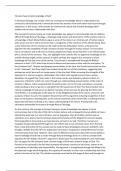Essay
A* essay on innate knowledge of God
- Institution
- OCR
This essay examines whether humans have an innate knowledge of God , if it intrinsically wired into humans from birth. Or if we understand God through scriptures and bible which is revealed at an epistemic distance .
[Show more]



